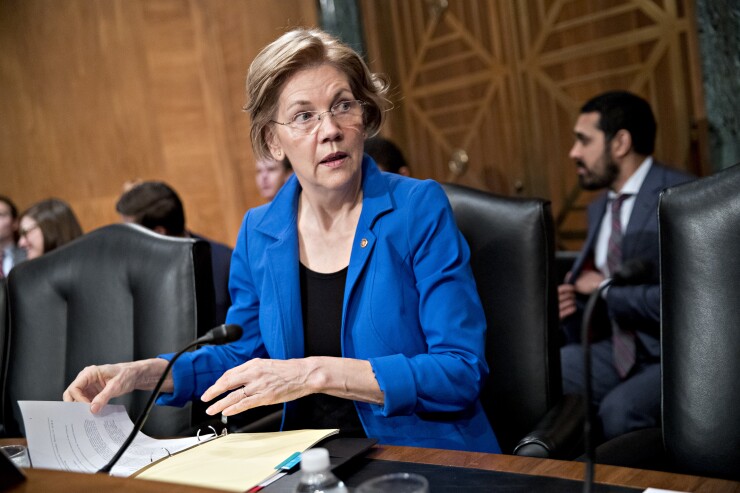WASHINGTON — One of the Senate Banking Committee's top progressive lawmakers circulated a letter this week to pressure the Office of the Comptroller of the Currency to abandon Trump-era guidance that cleared the banking sector to explore crypto-related banking activity.
In an undated draft letter that circulated among lawmakers on Wednesday, Sen. Elizabeth Warren, D-Mass., asked acting Comptroller Michael Hsu to formally rescind a series of interpretive letters issued by former acting Comptroller Brian Brooks in late 2020 and early 2021 that gave banks regulatory cover to explore decentralized finance, including digital asset custody and processing stablecoin payments.
Last fall, the Biden-era OCC led by Hsu attempted to limit the scope of Brooks's letters, telling banks in a new interpretive letter in November 2021 that they would need to receive approval from their regulators before diving into crypto activity.

But Warren's draft letter urges Hsu and the OCC to go further by formally rescinding the crypto guidance entirely.
"The interpretive letters issued under your predecessor essentially granted banks unfettered opportunity to engage in certain crypto activities and remains problematic," Warren wrote in the letter.
"Under your watch, the OCC issued updated guidance with the aim of reining in potential risks posed by your predecessor's policies," Warren said, referring to Hsu's
The contents of Warren's draft letter were first reported by Bloomberg News.
An OCC spokesperson said that the agency had not yet received the letter, adding: "Acting Comptroller Hsu's efforts have helped to ensure a strong and coordinated federal regulatory approach to crypto to minimize risks to the banking system and consumers."
Under the Trump administration, Brooks oversaw the publication of three interpretive letters that sought to clarify banks' ability under existing law to explore crypto-related bank activity. The letters were written by former OCC chief counsel Jonathan Gould.
In July 2020,
Warren pointed to the systemic volatility experienced by the crypto sector in recent months as ample reason for Hsu and the OCC to formally rescind its crypto guidance, arguing that regulators should act to prevent any contagion from reaching the banking system before it happens.
"Given the risks posed by cryptocurrencies to banks and their customers, we request that you withdraw OCC Interpretive Letters 1170, 1172, 1174, and 1179 and coordinate with the Federal Reserve and the Federal Deposit Insurance Corporation to develop a comprehensive approach that adequately protects consumers and the safety and soundness of the banking system," Warren said.
In a June speech at a DC Blockchain Summit, Hsu argued that his interpretive letter urging banks to proceed cautiously and check in with their regulator before engaging in crypto had "contributed to the safety and soundness of the banking system despite the heightened volatility and recent turmoil in the crypto markets."
"The resilience of the traditional banking system to the recent events in crypto is not an accident," Hsu said. "Rather, it is due, at least in part, to federal bank regulators' continued and intentional emphasis on safety and soundness and consumer protection."
Representatives for Sen. Warren did not respond to a request for comment.






